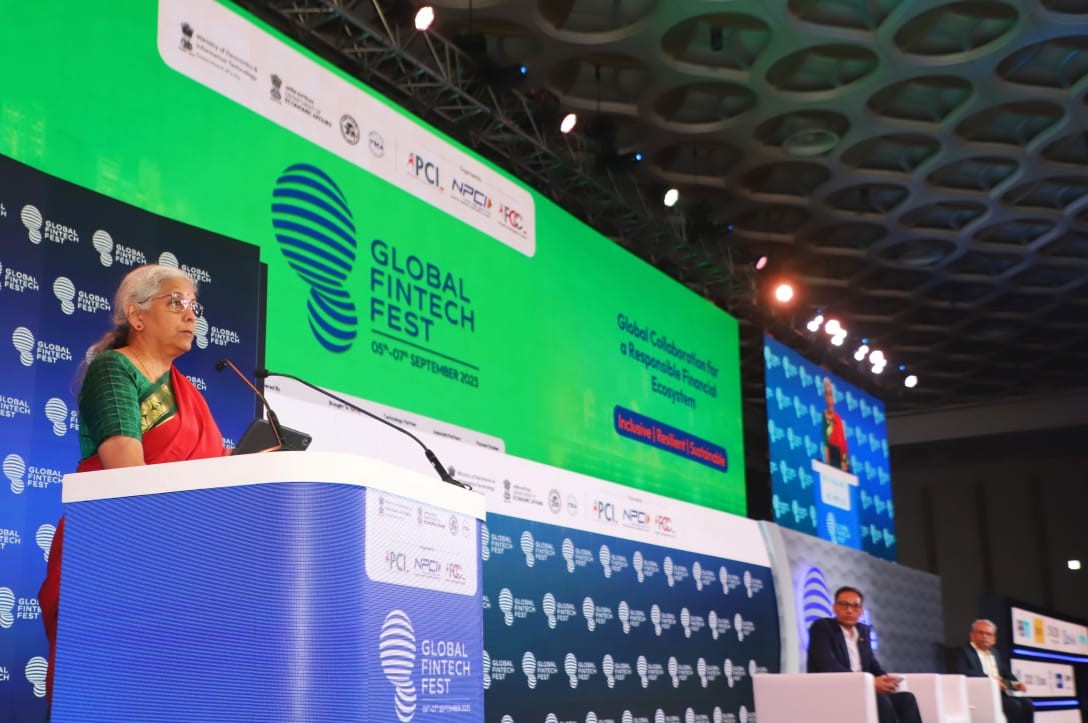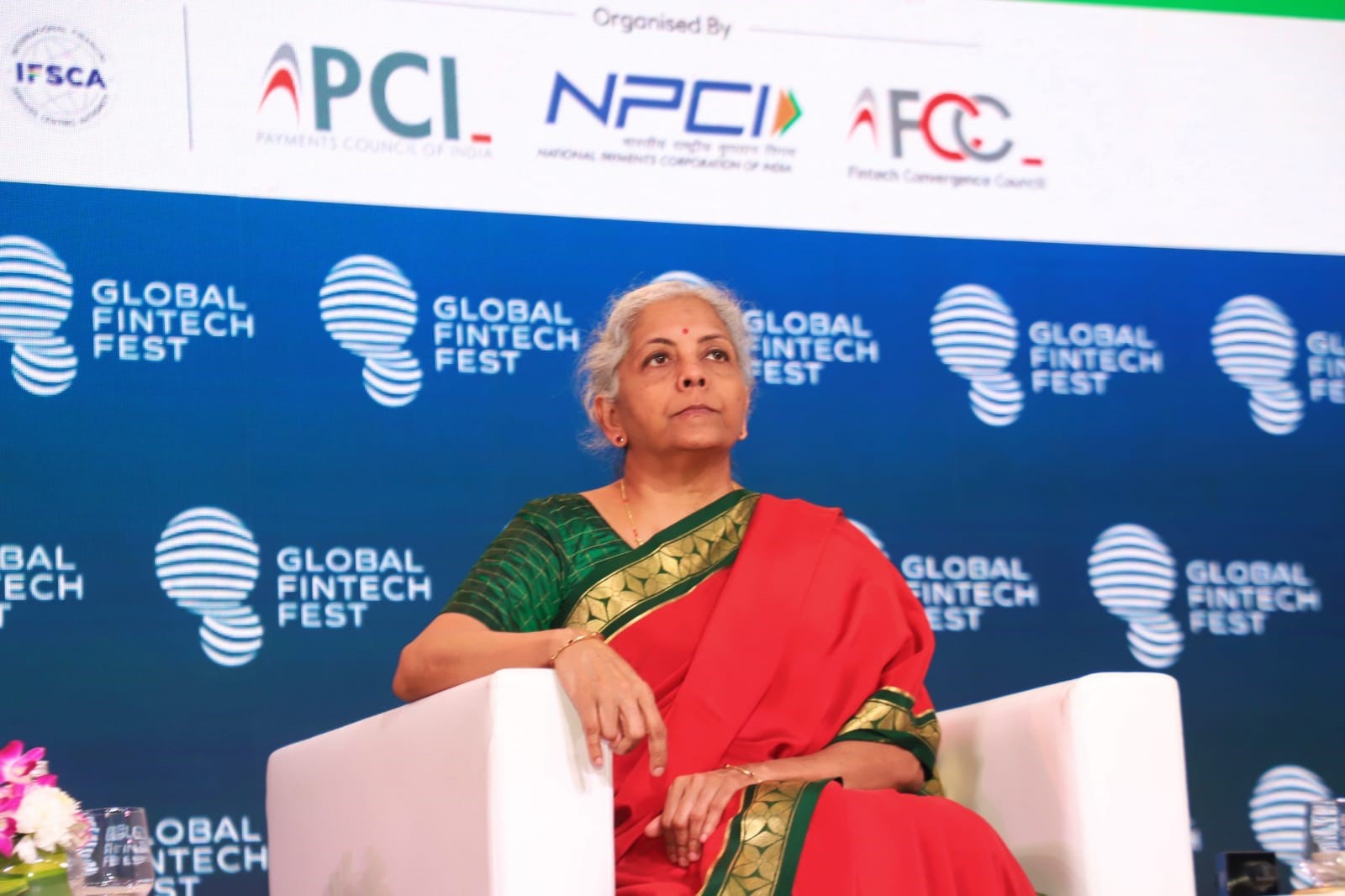Ministry of Finance
Finance Minister calls for global cooperation and collaboration to build an inclusive, resilient and sustainable financial eco-system
Smt. Nirmala Sitharaman inaugurates Global Fintech Fest 2023 in Mumbai
“India’s G-20 Presidency has called for a framework for handling issues relating to crypto-assets”
Posted On:
05 SEP 2023 6:08PM by PIB Mumbai
Mumbai, 5 September 2023
Union Finance and Corporate Affairs Minister Nirmala Sitharaman said technology is a powerful tool for building an inclusive, resilient and sustainable financial eco-system and called for global cooperation and collaboration, which she said, is absolutely critical for a responsible financial eco-system. The Union Minister was delivering the inaugural address at the three-day Global Fintech Fest, 2023 (GFF 2023), which started at Mumbai today. The Union Minister further urged that responsible globalization is the issue on which we will also have to contribute. In this connection, the Union Finance Minister also said that threats to global financial ecosystem, like physical border threats, cyber threats, crypto threats, drug menace, tax havens and round-tripping of resources and tax evasions need to be deliberated upon.
Speaking about India’s G-20 Presidency, Finance Minister Nirmala Sitharaman said that, India’s G-20 Presidency has called for a framework for handling issues relating to crypto-assets. IMF and FSB have given their synthesis paper. India’s Presidency has also discussed and sought for global cooperation in matters of reforms in multilateral development banks, global debts distress, tax evasion and two pillar tax solution amongst other issues. Finance Minister stated that enhancing cross-border payments has been a priority of the G20 since 2020. One of the priority focus areas under the Indian G20 presidency is “Information sharing on national experiences and international initiatives on interoperability of national fast payment systems for seamless flow of funds”. This is expected to enhance crossborder payments, stated the Finance Minister.

Finance Minister Nirmala Sitharaman stated the following to highlight India’s achievement in making its financial ecosystem inclusive:
- In a span of 4 years, the number of Demat accounts has increased by 2.5 times, from 4.1 crore in 2019-20 to 10 crore in 2022-23.
- A record number of Mutual Funds SIPs are being registered, which helps to generate long-term wealth, with the monthly flow in the mutual fund industry through the route reaching an all-me high of Rs 15,245 crore in July 2023.
- The Assets Under Management (AUM) of the Indian mutual fund industry have increased tremendously in the last decade. It grew more than four-fold from Rs 10 lakh crore in May 2014 to a significant Rs 46.37 lakh crore (July 2023).
- Top 30 cities of India are usually expected to be ahead in formal savings. However, in the last four years, the share of Cities beyond Top-30 cities in total mutual fund assets has grown from 15% to 26%.
- Instruments like SIPs are only democratizing this wealth-creation opportunity. Just like UPI (Unified Payments Interface), democratized payments and now ONDC (Open Network for Digital Commerce) is poised to do for e-commerce.
- Fin-techs are driving more inclusion and creating their niche. Today in lending, fintech have 36% share of new-to-credit customers vs 22% share in banks. In Payments, Fintech have 93% share of UPI transaction value vs 7% share in banks.
- In WealthTechs, Fintech broking have 80% share of active broking clients vs 20% active in traditional broking.
- ITR data released in August signals “Formalisation of the Indian Economy”. There is now wider access to benefits like credit facilities, and social security (pension, insurance, etc). Each Tax bracket (Tax Slab) has seen a minimum Threefold increase in tax filings, some even achieving a nearly Four-fold surge.
- While Maharashtra continues to be the leader, other states are moving up with respect to ITR filings. In places like North-East, Chhattisgarh, even Jammu & Kashmir, the new ITR filings have grown by double digits. This augurs well for the Fintech Industry.
- As per a SBI Research, Per capita income is expected to increase by 7.5 times from Rs 2 lakh in FY 2023 to Rs 14.9 lakh in FY 2047 (in USD terms, the corresponding increase comes to ~$12,400 in FY47 from ~$2500 in FY23).
- Our workforce is expected to increase by 19.5 crore to 72.5 crore in FY 2047 from 53 crore in FY 2022-23.
- Workforce share in population will increase from 37.9% in FY 2023 to 45% in FY 2047.
- Taxable Workforce /Workforce eligible to pay taxes to rise to 85.3%, from the current 22.4%. There would be approximately 48.2 crore IT filers in FY 2047 from approximately 7 crore in FY 2022-23. (seven times more).
Union Finance Minister Nirmala Sitharaman made the following points which are integral to building an inclusive, resilient and sustainable financial eco-system:
- Innovation should be at the forefront, with fintech firms pushing the boundaries of technology. We should strive to bring sustainability from “Concept to Action” and from “Ideation to Execution”, as we take responsibility for our future. Indian Startups have the ability to drive real innovation in Sustainability and ensure that it does not remain a mere buzzword.
- Demonstrating resilience amidst ongoing macroeconomic uncertainties, we must remain adaptable and strive to cultivate innovate solutions that cater to evolving demands.
- The aim should be to establish a financial system that can withstand future uncertainties and, more important, swiftly rebound by transforming challenges into opportunities.
- Security remains a top concern, which also enhances resilience of the ecosystem. With greater digitization comes increased cybersecurity threats. FinTech companies will need to invest heavily in robust security measures utilizing advanced encryption and other measures to protect user data and financial transactions.
- Global collaboration is essential for the flourishing of the FinTech sector. In an interconnected world, financial technology transcends borders, making cross-border partnerships crucial.
- Moreover, collaborative ventures open up access to vast and diverse customer bases, accelerating market penetration. $20 Trillion is estimated to be annual Cross-Border payments globally, incurring $120 Billion in transaction costs (BCG Study). India is the largest remittance receiver, with around $100 billion worth of remittances in 2022.
- The Payments Vision 2025 of RBI envisages active support for the global outreach initiatives to expand the footprint of domestic payment systems by collaborating with relevant stakeholders. Interlinkage between India’s UPI and Singapore’s PayNow was operationalised by Hon’ble Prime Ministers of both countries in February 2023. UPI and RuPay’s card acceptance at selected merchant locations are also live in UAE, Nepal, and Bhutan. Similar interlinkages are being explored with other jurisdictions as well.
- Given the size of the markets, the Indian Fintech industry should take the lead in the Cross-border payments ecosystem, given our rich & successful experience in Digital Payments.
The Union Finance Minister Nirmala Sitharaman also released a report titled ‘The Second Wave: Resilient, Inclusive, Exponential Fintechs’ and inaugurated a fintech exhibition at the venue. Kris Gopalakrishnan, Chair GFF 2023, and Naveen Surya, Chairman, Fintech Convergence Council, were also present amongst the dignitaries in the inaugural session. The theme of GFF 2023, jointly organized by National Payments Corporation of India (NPCI), Payments Council of India (PCI) and FinTech Convergence Council (FCC), is ‘Global Collaboration for a Responsible Financial Ecosystem’.

* * *
PIB Mumbai | JPS/SC/ DR
Follow us on social media:
@PIBMumbai  /PIBMumbai
/PIBMumbai  /pibmumbai
/pibmumbai  pibmumbai[at]gmail[dot]com
pibmumbai[at]gmail[dot]com  /PIBMumbai
/PIBMumbai  /pibmumbai
/pibmumbai
(Release ID: 1954903)
Visitor Counter : 2106